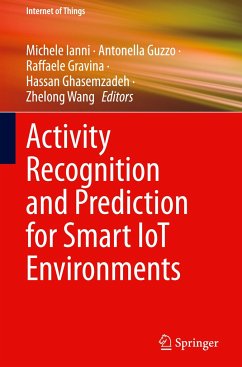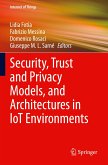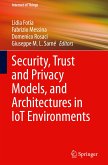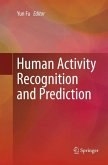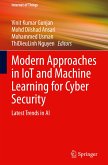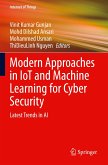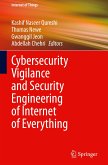Activity Recognition and Prediction for Smart IoT Environments
Herausgegeben:Ianni, Michele; Guzzo, Antonella; Gravina, Raffaele; Ghasemzadeh, Hassan; Wang, Zhelong
Activity Recognition and Prediction for Smart IoT Environments
Herausgegeben:Ianni, Michele; Guzzo, Antonella; Gravina, Raffaele; Ghasemzadeh, Hassan; Wang, Zhelong
- Gebundenes Buch
- Merkliste
- Auf die Merkliste
- Bewerten Bewerten
- Teilen
- Produkt teilen
- Produkterinnerung
- Produkterinnerung
This book provides the latest developments in activity recognition and prediction, with particular focus on the Internet of Things. The book covers advanced research and state of the art of activity prediction and its practical application in different IoT related contexts, ranging from industrial to scientific, from business to daily living, from education to government and so on. New algorithms, architectures, and methodologies are proposed, as well as solutions to existing challenges with a focus on security, privacy, and safety. The book is relevant to researchers, academics, professionals and students. …mehr
Andere Kunden interessierten sich auch für
![Security, Trust and Privacy Models, and Architectures in IoT Environments Security, Trust and Privacy Models, and Architectures in IoT Environments]() Security, Trust and Privacy Models, and Architectures in IoT Environments145,99 €
Security, Trust and Privacy Models, and Architectures in IoT Environments145,99 €![Security, Trust and Privacy Models, and Architectures in IoT Environments Security, Trust and Privacy Models, and Architectures in IoT Environments]() Security, Trust and Privacy Models, and Architectures in IoT Environments145,99 €
Security, Trust and Privacy Models, and Architectures in IoT Environments145,99 €![Human Activity Recognition and Prediction Human Activity Recognition and Prediction]() Human Activity Recognition and Prediction41,99 €
Human Activity Recognition and Prediction41,99 €![Modern Approaches in IoT and Machine Learning for Cyber Security Modern Approaches in IoT and Machine Learning for Cyber Security]() Modern Approaches in IoT and Machine Learning for Cyber Security160,49 €
Modern Approaches in IoT and Machine Learning for Cyber Security160,49 €![Modern Approaches in IoT and Machine Learning for Cyber Security Modern Approaches in IoT and Machine Learning for Cyber Security]() Modern Approaches in IoT and Machine Learning for Cyber Security121,99 €
Modern Approaches in IoT and Machine Learning for Cyber Security121,99 €![Decentralized Privacy Preservation in Smart Cities Decentralized Privacy Preservation in Smart Cities]() Cheng HuangDecentralized Privacy Preservation in Smart Cities129,99 €
Cheng HuangDecentralized Privacy Preservation in Smart Cities129,99 €![Cybersecurity Vigilance and Security Engineering of Internet of Everything Cybersecurity Vigilance and Security Engineering of Internet of Everything]() Cybersecurity Vigilance and Security Engineering of Internet of Everything137,99 €
Cybersecurity Vigilance and Security Engineering of Internet of Everything137,99 €-
-
-
This book provides the latest developments in activity recognition and prediction, with particular focus on the Internet of Things. The book covers advanced research and state of the art of activity prediction and its practical application in different IoT related contexts, ranging from industrial to scientific, from business to daily living, from education to government and so on. New algorithms, architectures, and methodologies are proposed, as well as solutions to existing challenges with a focus on security, privacy, and safety. The book is relevant to researchers, academics, professionals and students.
Produktdetails
- Produktdetails
- Internet of Things
- Verlag: Springer / Springer Nature Switzerland / Springer, Berlin
- Artikelnr. des Verlages: 978-3-031-60026-5
- 2024
- Seitenzahl: 192
- Erscheinungstermin: 21. August 2024
- Englisch
- Abmessung: 241mm x 160mm x 17mm
- Gewicht: 403g
- ISBN-13: 9783031600265
- ISBN-10: 3031600266
- Artikelnr.: 70294059
- Herstellerkennzeichnung Die Herstellerinformationen sind derzeit nicht verfügbar.
- Internet of Things
- Verlag: Springer / Springer Nature Switzerland / Springer, Berlin
- Artikelnr. des Verlages: 978-3-031-60026-5
- 2024
- Seitenzahl: 192
- Erscheinungstermin: 21. August 2024
- Englisch
- Abmessung: 241mm x 160mm x 17mm
- Gewicht: 403g
- ISBN-13: 9783031600265
- ISBN-10: 3031600266
- Artikelnr.: 70294059
- Herstellerkennzeichnung Die Herstellerinformationen sind derzeit nicht verfügbar.
Dr. Michele Ianni is an Assistant Professor at the Department of Computer Science, Modeling, Electronic and System Engineering (DIMES) of the University of Calabria, Italy. He received the Ph.D. degree in Information and Communication Technologies from the University of Calabria, Italy, in 2018. During his Ph.D. he was a visiting researcher in SecLab, University of California, Santa Barbara. Previously, He was a Postdoctoral Researcher at the University of Calabria, Italy and at the University of Verona, Italy. In 2023, he was a visiting professor at the Instituto Superior Técnico of the University of Lisbon, Portugal. His main research interests include Binary Analysis and Exploitation, Obfuscation, Watermarking, Malware, Trusted Execution Environments and IoT Security. Antonella Guzzo is an associate professor of Computer Engineering at the DIMES Department, University of Calabria, Italy. Previously, she was a research fellow in the High Performance Computing and Networks Institute (ICAR-CNR), National Research Council, Italy. She is member of the Ph. D. board in ICT at University of Calabria and IEEE member. Her research interests include process mining, data mining, artificial intelligence and deep learning. She authored more than 75 papers in top international journals and conferences. She serves as reviewer for over 20 international journals and as Program Committee (PC) member in many international conferences and workshops. Raffaele Gravina received a PhD degree in Computer and Systems Engineering from the University of Calabria, Italy, respectively in 2012. Between 2008 and 2010 he was employed as researcher at the Wireless Sensor Networks Lab in Berkeley, California. Since 2022, he is Associate Professor of Computer Engineering at theDepartment of Informatics, Modeling, Electronics, and Systems Engineering of the University of Calabria. He is a young foreign visiting scientist at the Shenzhen Institutes of Advanced Technology, Chinese Academy of Sciences. His research activities include high-level programming methodologies and frameworks for wearable computing systems, pattern recognition and machine learning algorithms on physiological signals, human activity recognition, emotion detection, and Internet-of-Things. He has authored more than 100 indexed international publications and he has been involved in national and international research projects with various roles, including Principal Investigator. Hassan Ghasemzadeh is an associate professor of biomedical informatics in the College of Health Solutions and a graduate faculty within the computer science, computer engineering, and biomedical engineering programs at Arizona State University (ASU). He is also an adjunct faculty of computer science at Washington State University (WSU). Prior to joining ASU, he was an assistant/associate professor of computer science at WSU (2014-2021) and a postdoctoral research manager at the University of California Los Angeles (2011-2013). His research interests include mobile health, machine learning and algorithm design. Prof. Zhelong Wang received his B.Sc. and M.Sc. degrees in automatic control from Dalian University of Technology, Dalian, China, in 1996 and 1999, respectively, and the Ph.D. degree in robotics from University of Durham, U.K. in 2003. In 2004, he joined School of Electronic and Information Engineering, Dalian University of Technology, where he is currently a Professor, a Ph.D. supervisor and the head of Lab of Intelligent System, DUT. He was a visiting scholar at Stanford University, USA, in 2013. His research interests include body sensor networks, human-machine interaction, wearable intelligent system and robotics.
Introduction.- Methodology for human activity recognition based on wearable sensor networks.- Efficient Sensing and Classification for Extended Battery Life.- Multi-user activity monitoring based on contactless sensing.- An efficient approach exploiting Ensemble Learning for Human Activity Recognition.- Activity Recognition Using 2-D LiDAR based on Improved MobileNet.- Habit mining through process-mining techniques. Survey and research challenges.- The role of ML in Activity Recognition in the Industry 4.0.- IoT Based HAR patterns using Sensors based Approach in smart environment and enabled assistive technologies.- Trace2AR: a novel embedding for the detection of complex activity recognition.- Situation Aware Wearable Systems for Human Activity Recognition.- Conclusion.
Introduction.- Methodology for human activity recognition based on wearable sensor networks.- Efficient Sensing and Classification for Extended Battery Life.- Multi-user activity monitoring based on contactless sensing.- An efficient approach exploiting Ensemble Learning for Human Activity Recognition.- Activity Recognition Using 2-D LiDAR based on Improved MobileNet.- Habit mining through process-mining techniques. Survey and research challenges.- The role of ML in Activity Recognition in the Industry 4.0.- IoT Based HAR patterns using Sensors based Approach in smart environment and enabled assistive technologies.- Trace2AR: a novel embedding for the detection of complex activity recognition.- Situation Aware Wearable Systems for Human Activity Recognition.- Conclusion.

